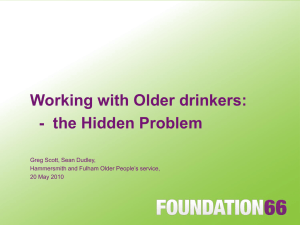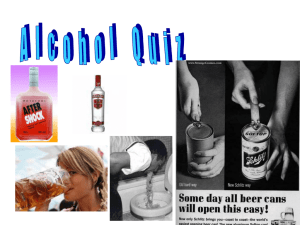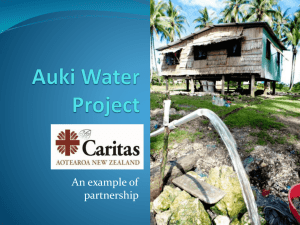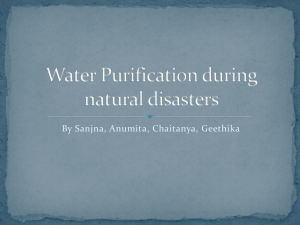Maine CDC Drinking Water Program
advertisement
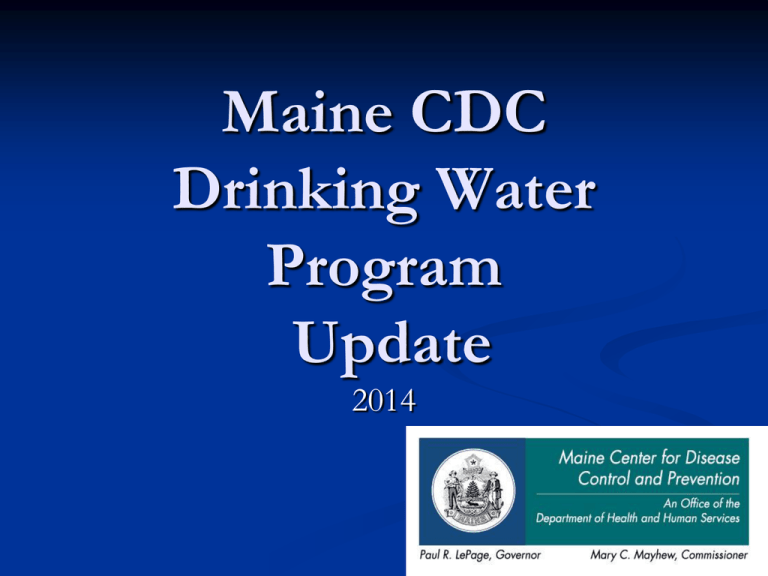
Maine CDC Drinking Water Program Update 2014 DWP Staffing Updates Jed Hawes, Compliance Officer Bill Wallace, Compliance Officer Christine Blais, Assistant Laboratory Certification Officer Keep Your Drinking Water Safe: Protect Your Source Take Your Samples Maintain Your Treatment Inspect Your Pipes & Tanks Drinking Water State Revolving Fund $200 Million DWSRF Milestone Celebration held on May 5, 2014 in Gardiner Gardiner’s 2013 DWSRF tank replacement project pushed total dollars loaned through DWSRF since 1997 to $200M Keep Your Drinking Water Safe: Protect Your Source Take Your Samples Maintain Your Treatment Inspect Your Pipes & Tanks 2015 DWSRF 39 project applications were received totaling requests of $38 Million Draft Primary List prepared with 21 projects with $19 Million of DWSRF Funding. Preparation on the 2015 Intended Use Plan and Final Primary List is expected to completed in January 2015. Keep Your Drinking Water Safe: Protect Your Source Take Your Samples Maintain Your Treatment Inspect Your Pipes & Tanks 2015 DWSRF State Match November 2014 Bond Referendum – approved by Voters $1.8 million total $1.3 million for 2014 State Match $500,000 for 2015 Balance of 2015 State Match – Available in June 2015 through the State wholesale liquor contract Keep Your Drinking Water Safe: Protect Your Source Take Your Samples Maintain Your Treatment Inspect Your Pipes & Tanks Grant Opportunities Wellhead Protection Grants Source Water Protection Grants Up to $5,000 per project ($10,000 for exceptional circumstances) Up to $5,000 per project ($10,000 for exceptional circumstances) Capacity Development Grants Up to $10,000 ($15,000 for exceptional projects) Keep Your Drinking Water Safe: Protect Your Source Take Your Samples Maintain Your Treatment Inspect Your Pipes & Tanks Grant Opportunities Consolidation Grants Very Small Water System Compliance “Loan” Up to $100,000 Up to $50,000 Sanitary Well Seal Cap Program Up to $250 Keep Your Drinking Water Safe: Protect Your Source Take Your Samples Maintain Your Treatment Inspect Your Pipes & Tanks Land Acquisition Loans Purchase or Conserve Source Water Protection Land Contact Erika Bonenfant Keep Your Drinking Water Safe: Protect Your Source Take Your Samples Maintain Your Treatment Inspect Your Pipes & Tanks Pace of Spending Unliquidated Obligations (ULOs) Congress questioning the need for additional funding if the current funding isn’t being spent EPA is asking states to consider ways of moving money faster Keep Your Drinking Water Safe: Protect Your Source Take Your Samples Maintain Your Treatment Inspect Your Pipes & Tanks DWSRF Needs Survey Every Four years 25 Water Systems 2011 Needs Survey – Maine has a $1.18 billion funding need over the next 20 years ($59 million per year) 2015 Needs Survey starts in Spring 2015 Keep Your Drinking Water Safe: Protect Your Source Take Your Samples Maintain Your Treatment Inspect Your Pipes & Tanks Compliance Topics Keep Your Drinking Water Safe: Protect Your Source Take Your Samples Maintain Your Treatment Inspect Your Pipes & Tanks Monitoring and Reporting Sample early in the compliance period. Allow for lab analysis time. Analysis results must be submitted by certified lab by the 10th day of the following month to avoid a reporting violation. Monthly Operating Reports submitted by the 10th of the following month- must be signed by the Designated Operator unless otherwise approved by the DWP Keep Your Drinking Water Safe: Protect Your Source Take Your Samples Maintain Your Treatment Inspect Your Pipes & Tanks NSF/ANSI Standard 61 All materials, products and coatings that contact drinking water must be certified to meet NSF/ANSI Standard 61 Standard 61 requires compliance with the lead free provisions of the SDWA Keep Your Drinking Water Safe: Protect Your Source Take Your Samples Maintain Your Treatment Inspect Your Pipes & Tanks NSF/ANSI Standard 60 All chemicals must be certified to Standard 60 Sanitary Survey Labeling on packaging and/or Delivery and manufacturer paperwork Request to add or change chemicals All changes to chemicals must be approved by the DWP Documentation must include Standard 60 certification Repackaging on-site Keep Your Drinking Water Safe: Protect Your Source Take Your Samples Maintain Your Treatment Inspect Your Pipes & Tanks Revised Total Coliform Rule Effective April 2016 Non-Acute MCL goes away Requires Assessments and Corrective Action“Fix and Find” Keep Your Drinking Water Safe: Protect Your Source Take Your Samples Maintain Your Treatment Inspect Your Pipes & Tanks Revised Total Coliform Rule Seasonal Water Systems – Non-Community Systems with less than 12 months of operation All or part of the system shuts down Annual Start-up plan Increased Monitoring Frequency - monthly for most seasonal systems and some community systems Keep Your Drinking Water Safe: Protect Your Source Take Your Samples Maintain Your Treatment Inspect Your Pipes & Tanks Revised Total Coliform Rule Five the Following Month Rechecks Decreases to Three the Following Month Decreases from Four to Three Monthly Monitoring – No Three the Following Month Keep Your Drinking Water Safe: Protect Your Source Take Your Samples Maintain Your Treatment Inspect Your Pipes & Tanks Revised Total Coliform Rule Training Opportunities Opening for the Season classes – Spring 2015 Winter/Spring 2015 – MRWA MWUA – Utility Sample Site Plan – End of March 2015 Keep Your Drinking Water Safe: Protect Your Source Take Your Samples Maintain Your Treatment Inspect Your Pipes & Tanks Written SOPs The operator in responsible charge shall ensure that adequate operational and emergency response procedures are in place to enable licensed operating personnel to make appropriate process control system integrity decisions about water quality and quantity. Nate Saunders presentation at 2:20 Today – Public Water System Owner and Operator Responsibilities Source Water Protection Keep Your Drinking Water Safe: Protect Your Source Take Your Samples Maintain Your Treatment Inspect Your Pipes & Tanks Source Water Protection DWP will produce list of community and NTNC systems with populations of 250 or more that are not considered to be “protected” systems. (this means no updated WHPP or SWPP, or not implementing source water protection activities identified in plans); DWP will provide maps of protection areas (included updated maps for river/stream systems); Source Water Protection Consultants will be hired to update PSC list for each PWS; Consultants will work with systems to create or update SWP plans. This will include creating an implementation schedule for source water protection activities and continuous plan updates; Results will put systems in better position to be granted SOC waivers or reduced monitoring under the RTCR. Elk River, WV – Lessons Learned Presentation at 2:20 today Mike Abbott, DWP Ted Lavery, EPA Mapping River Sources Berwick Table Top Exercise Updated DWP Website Keep Your Drinking Water Safe: Protect Your Source Take Your Samples Maintain Your Treatment Inspect Your Pipes & Tanks Keep Your Drinking Water Safe: ~10,000 gallons of 4-methylcyclohexane methanol (MCHM) leaked from 40,000 gallon holding tank into Elk River Water intakes at Kanawha Valley water treatment plant ~1.5 miles downstream of the leak Do Not Drink Order issued to 9 counties, as many as 300,000 people Keep Your Drinking Water Safe: 2008 Alamosa, Colorado: Salmonella contamination of the water system Estimated 1,300 illnesses (almost 15% of population) Groundwater sources- not disinfected Keep Your Drinking Water Safe: Trihalomethanes (THMs) are a group of byproducts formed when chlorine is used to disinfect water high in organic matter Orono-Veazie Water District exceeded the federal standard of 80ppb in 2012 Keep Your Drinking Water Safe: December 2013: 1,900 gallons of heating oil was spilled during an oil tank delivery at the Hebron Station School School placed on Do Not Drink Order during investigation Carbon filters were also installed as precaution Keep Your Drinking Water Safe: Break in 20-inch water main flooded streets in Downtown Portland Boil Water Order issued, affecting ~4,000 homes and businesses Keep Your Drinking Water Safe: 2000: Walkerton, Ontario 7 deaths and over 2,300 illnesses Investigation found: Operators failed to use adequate doses of chlorine, failed to monitor chlorine residuals daily, and made false entries about residuals in daily operating records Maine DWP - "Water Together for Safe Drinking Water" Keep Your Drinking Water Safe: Questions Keep Your Drinking Water Safe: Protect Your Source Take Your Samples Maintain Your Treatment Inspect Your Pipes & Tanks

